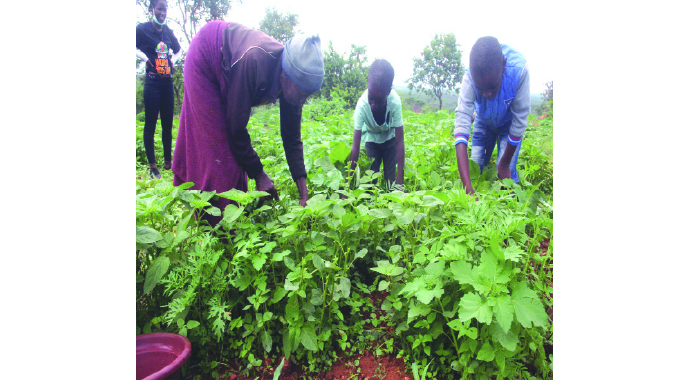Edible indigenous plants sustaining rural families
The Chronicle
15/1/2022
Angela Sibanda, Chronicle Reporter
EDIBLE indigenous plants are a blessing to people, especially those in the rural areas, at this time of the year.
Matabeleland is blessed with edible indigenous plants that grow throughout the region though some vary from place to place.
During the rainy season, people feast on indigenous plants such as ulude (cats whiskers/nyevhe), imbuya or rough pigweed (amaranthus hybridus), black jack (umhlabangubo /ucucuza and, okra (idelele) among others.

These plants are eaten as relish with isitshwala and in cases of extreme drought, some families in rural areas can eat them alone as a meal.
During a visit to Siphezini Village, a Chronicle news caught up with villagers who were harvesting ulude and idelele.
Mrs Thandiwe Ndlovu, said indigenous vegetables were a blessing to the rural populace given the prevailing economic situation in the country.
“For most of the people who live in the rural areas, getting relish for our everyday meals is a big challenge, especially for supper which is the most important meal around here,” she said.
Mrs Ndlovu said due to the delayed rains, not all households in the village have ulude that is ready to be harvested.
“The delayed rains really affected us and not everyone has ulude yet but under normal circumstances, everyone here will be having these plants in abundance to a point that we end up weeding them down to give space to our crops”.
“We can harvest and dry these and sell them to other villages that don’t have them and even take them to the city where we sell them to market vendors,” she said.
“But during this season we are blessed because if we can’t get relish we just go to the fields and get ulude or idelele and we are good to go for supper.”
The plants can be dried and stored as umfushwa that will be cooked and eaten during winter and autumn as the plants would have dried up.
When dried they can be combined with other indigenous foods to bring out delicious recipes that are common among most cultures countrywide.
Another villager, Ms Khemisi Ngwabi (67) said the rainy season always brings relief for her and her four grandchildren.
“I am raising these children on my own and I am now old and my children are not here to help me. I rely on the little that I get from neighbours but now that there is some relish in the fields, I can give people a break,” she said.
In an interview, a specialist in indigenous foods, Prince Sivalo Moyo said these plants are rich in nutritional value more than most exotic vegetables that many people prefer.
“A lot of people, especially the young generation, think that eating these indigenous plants is a sign of poverty, but little do they know that these plants are rich in nutrients such as vitamin C,” he said.
“Ulude/nyevhe is rich in vitamin A, B, C. It also has high levels of magnesium, calcium and iron. The characteristic.”
Mr Moyo also said from his experience with indigenous plants, he has realised that they vary from place to place.
“There are places where you would not find these plants, and in some instances, you may find people treating the plant as a weed, not an edible plant.
“Plants like ucucuza (black jack), are not an edible plant, some people think it is just a weed that needs to be destroyed and thrown away,” he said.
Prince Sivalo, as he is famously known, is an indigenous food cook who travels around Zimbabwe exploring different cultures and is currently running a YouTube show that exposes viewers to various indigenous meals and recipes.
Mr Moyo also said when cooking these plants one needs to be careful and patient.
“Things like okra and imbuya need careful attention especially if it would have been harvested soon after the rains, it will be filled with a lot of soil that might not be seen through a simple observation.
“Then one has to be careful with ulude, it has a bitter taste which is caused by volatile oils and it requires to be boiled for a long time until it loses the bitter taste, or else one might fail to eat it.
And these plants don’t need to be mixed with things such as gravies and soups, they taste better when cooked on their own,” he added.
He also urged people to preserve indigenous foods and teach the young generation about them.
“With all of our cultural aspects slowly disappearing we need to at least remain proud of our food as Zimbabweans,” Moyo said.
